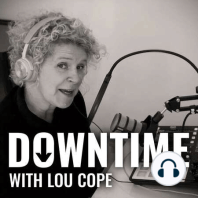43 min listen

Movement Direction with Ayse Tashkiran and Ingrid Mackinnon
FromDOWNTIME - interviews with dance artists & arts leaders, talking about dance & the arts
Movement Direction with Ayse Tashkiran and Ingrid Mackinnon
FromDOWNTIME - interviews with dance artists & arts leaders, talking about dance & the arts
ratings:
Length:
64 minutes
Released:
Jan 6, 2023
Format:
Podcast episode
Description
Lou talked with Movement Directors Ayse Tashkiran and Ingrid Mackinnon about how they approach the key relationships at the heart of their work - namely directors, individual and groups of actors and other collaborators; how they try to identify and develop the ‘feeling’ or ‘colour’ of a production and how they move between leading and observing.They also shared their thoughts on how to ask for time to do the work they need to do, the practicalities that surround how often they are in the space, the visions they have for the role of movement direction in the future, and how important (and sometimes difficult) it is to bring one’s authentic self to work every day – no matter the context.As someone who works mainly in dance, but whose background is in theatre, Lou has always been fascinated by those who crossed the line in the other direction – bringing movement training to theatre. Like dramaturgs, movement directors choose to work in the murky shade – rarely needing or getting public recognition for their work, but nevertheless being thoroughly committed to the development of the craft, the art form and the artists they work with. And of course, we are all engaged in thinking about the dramaturgy of movement. Ayse Tashkiran is a movement director, teacher and researcher in the field of movement in theatre. Her work aims to free and empower the actor through motion, imagination and emotion. She act as an advocate for the field of movement direction and create links between directors, actors and movement directors. Ayse has been at the helm of the MA MFA Movement: Directing and Teaching - at Royal Central School of Speech and Drama since 2004. She is an Associate Artist at the RSC (having worked on As You Like It, The Provoked Wife, Romeo and Juliet, The Duchess of Malfi, and many more), and she’s worked on productions at Donmar Warehouse, Shakepeare’s Globe, Birmingham Rep, Theatre Royal Stratford East, The Young Vic to name but a few. She is the co-founder of the Movement Directors’ Association, the first professional body advocating on behalf of movement direction practices and conditions.Publications include her own book Movement Directors in Contemporary Theatre: Conversations on Craft – yes she literally wrote the book on it; and contributions to The Actor and His Body by Litz Pisk, and The Routledge Companion to Jacques Lecoq.Ingrid Mackinnon is a London based movement director and choreographer. Movement direction credits include work for the National Theatre of Scotland, Fuel, Kiln Theatre, Birmingham Rep; Theatre Royal Stratford East; Regent’s Park Open Air Theatre – on a production of Romeo and Juliet for which she won Black British Theatre Awards 2021 Best Choreography Award. Other credits include:Intimacy support for Antigone, 101 Dalmatians, Legally Blonde, Carousel (Regent’s Park Open Air Theatre) and Intimacy Director for Girl on An Altar (Kiln Theatre), Enough of Him (National Theatre of Scotland).
Released:
Jan 6, 2023
Format:
Podcast episode
Titles in the series (32)
Downtime with Botis Seva & Lee Griffiths by DOWNTIME - interviews with dance artists & arts leaders, talking about dance & the arts